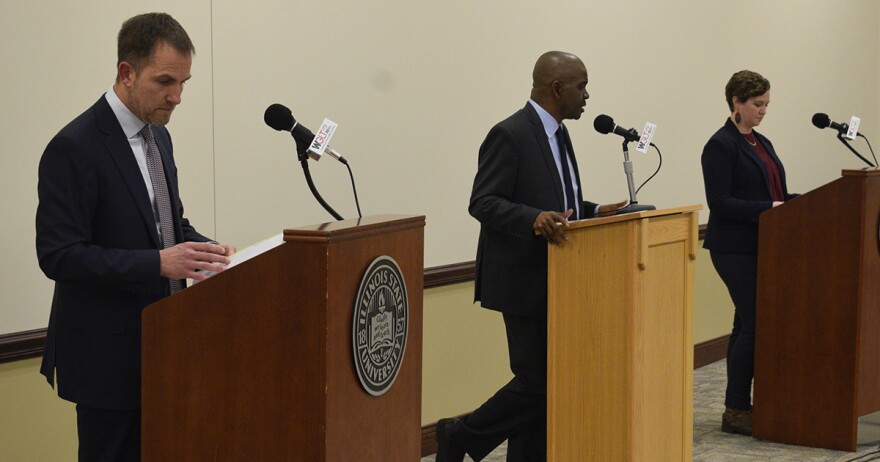The three candidates for Bloomington mayor agree that the economic recovery from the pandemic will demand a lot of attention if they’re elected. They have different views of what the city government’s role should be in supporting that recovery.
RELATED STORY: Bloomington City Council Candidates Discuss Pandemic Recovery Priorities
Jackie Gunderson
Gunderson is running among a slate of candidates in the progressive People First Coalition. The ISU procurement manager ran unsuccessfully for McLean County Board in 2020, as a Democrat.
Gunderson praised the city’s direct relief program for residents and businesses. But making sure Bloomington’s needs are met may require tapping into the city’s reserves if necessary, she said.
“The City of Bloomington does have reserves that are for a rainy day, and I would consider a global pandemic that’s being going on for a year to be a rainy day,” she said. “So, the reallocation of some of those funds to make sure the people that we’re most concerned about are not falling through the cracks. I also think economic recovery is important and making sure that businesses stay afloat. Obviously, the safety and health of my neighbors is more important to me than that. But I think there’s a way to prioritize both.”
The issue requires nimble collaboration, Gunderson said.
“I have the ability to make sure people whose voices should be heard and should have a seat at the table are involved,” she said. “I don’t know everything. And the city council doesn’t know everything. So it’s making sure that we give space to say, ‘These are the things we might have missed.’”
Mboka Mwilambwe
Mwilambwe is the only mayoral candidate with previous elected experience. He has served on the city council for 10 years, representing Ward 3 on the city’s east side. He works at Illinois State University on anti-harassment and non-discrimination issues.
Mwilambwe pointed to the city’s existing COVID aid programs, including the direct aid to residents and small-business assistance, as successful.
He said long-term recovery will require economic growth and luring new businesses to Bloomington, something he trusts in the hands of the city’s economic development staff and partner agencies. He said the work-from-home revolution that was accelerated by COVID presents a new challenge for the city, in which the economy relies on many white-collar, cubicle-culture jobs.
“We do need to come together as a community, to have really serious conversations to try and figure out what exactly does that mean for us,” Mwilambwe said. “One of the things I’d like us to focus on is … what types of businesses can we attract to Bloomington that require a physical presence?”
The candy maker Ferrero’s recently announced expansion in Bloomington is a good example of that, Mwilambwe said. Ferrero will take advantage of tax incentives through a local enterprise zone to build the $75 million expansion.
Mike Straza
Straza is an entrepreneur and business consultant who is now operations manager at a Bloomington church. He’s been endorsed by the McLean County Chamber of Commerce’s political action committee.
Straza said Bloomington has long existed in an “economic bubble” protected by its largest employers, like State Farm, Country Financial and Illinois State University.
“That’s in danger of bursting, especially since COVID,” Straza said.
That makes this a good time not to be complacent, he said. The city should play a role in finding and developing more skilled labor, he said. It should also take a special interest in redeveloping underutilized properties, such as the half-empty Eastland Mall. There is a way to do that without putting the burden on taxpayers, he said.
“There’s gonna be some growth needed to get us out of this space we’re in,” Straza said.
He said the recovery could take two to four years, especially in the decimated service sector. Restarting the service sector is essential to getting the economy back on track, he said.
During a recent WGLT forum, Straza said Illinois ranked "49th out of 50 states in terms of economic recovery, and that's not good." He attributed that stat to an article from the conservative think tank Illinois Policy Institute, which itself cited an analysis from WalletHub.
That WalletHub analysis shows Illinois was indeed ranked No. 49, but only by one metric—the change in initial jobless claims for just one week in February compared to that week two years ago. Illinois actually ranks middle-of-the-pack at No. 25 for best or worst recovery since the start of the pandemic, according to WalletHub.
The election is April 6. Early voting begins March 12.
There's no subscription fee to listen or read our stories. Everyone can access this essential public service thanks to community support. Donate now, and help fund your public media.



